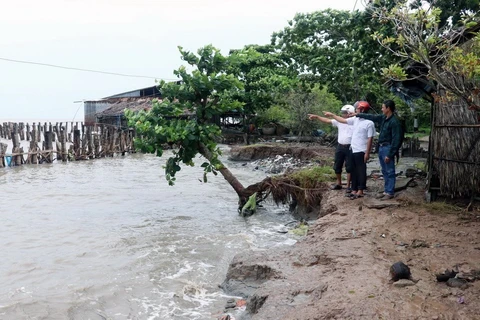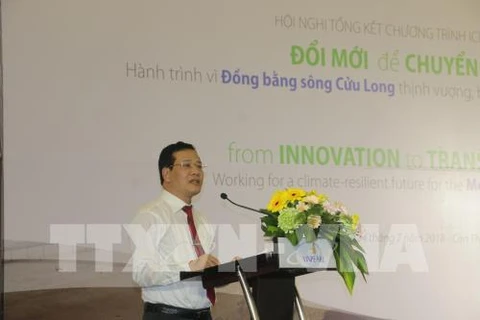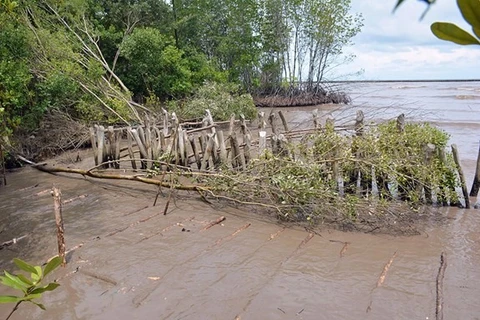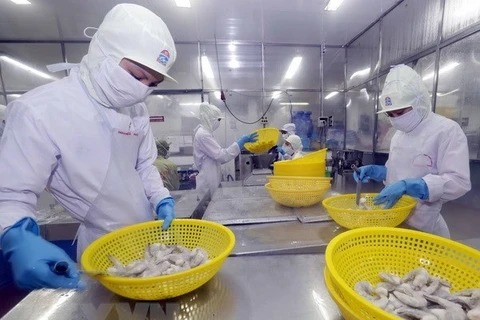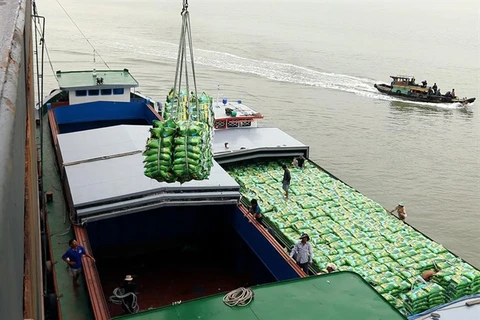 A farmer in Long An province’s Khanh Hung commune harvests linh fish during the flooding season (Photo: VNA)
A farmer in Long An province’s Khanh Hung commune harvests linh fish during the flooding season (Photo: VNA) Hanoi (VNS/VNA) - More breakthrough solutions are needed to help farmers in the Mekong Delta cope with unpredictably rising water levels, according to experts.
This year, floodwaters caused by heavy rains and water of the Mekong River have been rising at alarming levels, submerging thousands of hectares of rice and crops and causing losses for farmers in Mekong Delta provinces.
The water levels, which are higher than the average over the past decade, are forecast to reach warning Level 2 on the Tien and Hau rivers in the next few days.
Since early last month, flooding has struck An Giang, Dong Thap and Long An provinces. Local farmers have been relieved as increasing water helps wash away saline residue and brings in aquatic resources.
In the past two years, floods were either low or non-existent, causing severe drought and saline intrusion.
However, early and powerful flooding has caused unpredictable impacts for farmers.
Truong Bao Dung, a farmer in An Phu fistrict’s Vinh Hau commune in An Giang province, said he set up a net of 20 metres to catch linh fish, a specialty in flood season, but had only caught one or two kilogrammes per day.
“The water is about 1.2 metres higher than the previous year and flowing very fast, sweeping away most of the fish out of the net,” he said.
Nguyen Van Coi, another farmer in the commune, is in the same situation. Coi said he only caught three or four kilogrammes of tiny fish, earning 50,000 VND (2.1 USD) per day.
Normally, he could earn up to 200,000 VND (8.6 USD) per day.
Flooding has also affected the crops. Some 8,000 out of 111,000 hectares of rice are located outside the dyke system and at risk of being flooded. In Dong Thap province, at least 150 hectares of crops outside dyke-protected areas have been submerged. Many dykes are likely to be affected by floods, forcing farmers to make an early harvest.
Over the years, farmers have been encouraged to plant three crops per year instead of four as usual to give the soil a rest. During this time, the water from the floods would enter the closed embankment and bring alluvium, fish and other aquatic resources to the region, improving productivity of crops and fishery resources for farmers.
However, after two years of facing drought due to low flood, many farmers have planted fruit trees instead of letting the soil rest and regain nutrition as the Ministry of Agriculture and Rural Development encouraged.
Pham Thanh Tam, deputy head of An Phu district’s Agricultural Office, said many farmers whose crops are located in dyke-protected areas have asked authorities to stop discharging water as they had switched to fruit trees.
Le Van Ne, farmer in Da Phuoc commune, said floodwaters have not been discharged for years. Ne has spent 240 million VND (10,320 USD) to switch his rice crop into fruit trees on 1.2 hectares of soil since early this year to get more profit.
He has asked local authorities to keep pausing the discharge of floodwaters.
Total cultivated land in the commune is nearly 1,300 hectares. About 220 hectares of rice crops have been switched to fruit trees and subsidiary crops, with the farmers who haven’t losing out.
As a result, the ministry has targeted restructuring agricultural production in the Mekong Delta to be suitable with climate change and floodwaters.
In An Giang, five models of diversified livelihoods, which combine rice crops and shrimp farms and mushrooms and grass for cows, will be implemented in areas outside of dykes in Vinh Hau, Vinh Loc and Phu Huu communes in An Phu district.
The development of diversified livelihoods for farmers in low-lying areas is an urgent task. This would help ensure the lives of farmers, improve the quality of soil thanks to the floodwaters and ensure rice production in the region, which is considered the country’s rice granary.
According to the ministry’s General Department of Irrigation, five irrigation projects with total capital of more than 4.7 trillion VND (202 million USD) are needed to help farmers in the Mekong Delta live with floods.
Tran Anh Thu, director of An Giang province’s Department of Agriculture and Rural Development, said the province was conducting a project to improve the water adaptability and management of the upstream areas in the Mekong River in An Phu district.
It plans to focus on investing in dykes and embankments for floodwater storage.
In addition, policies on supporting and creating faith for farmers to implement the new livelihoods needed priority, experts said. Local authorities in the Mekong Delta should encourage co-operatives to apply the new models.
Local authorities should work with other sectors to attract enterprises to invest in the model from building processing factories to consumption and export to create more profit for farmers, they said.-VNS/VNA
VNA
